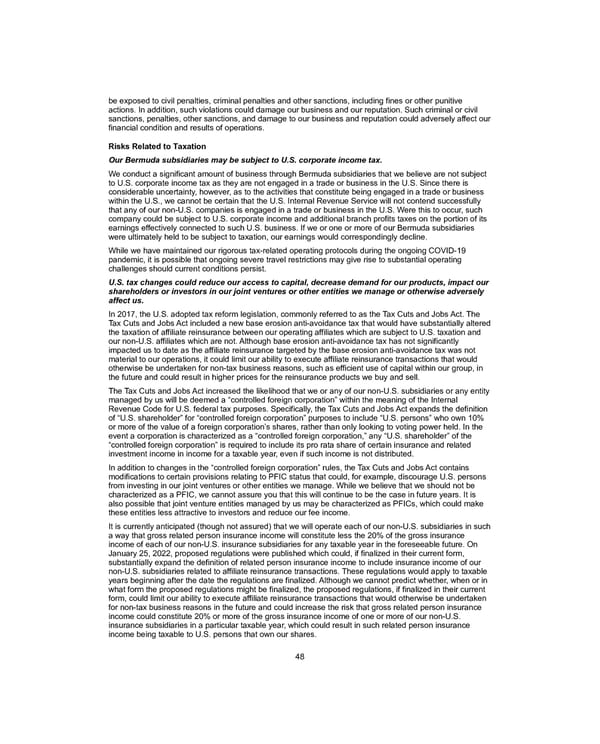be exposed to civil penalties, criminal penalties and other sanctions, including fines or other punitive actions. In addition, such violations could damage our business and our reputation. Such criminal or civil sanctions, penalties, other sanctions, and damage to our business and reputation could adversely affect our financial condition and results of operations. Risks Related to Taxation Our Bermuda subsidiaries may be subject to U.S. corporate income tax. We conduct a significant amount of business through Bermuda subsidiaries that we believe are not subject to U.S. corporate income tax as they are not engaged in a trade or business in the U.S. Since there is considerable uncertainty, however, as to the activities that constitute being engaged in a trade or business within the U.S., we cannot be certain that the U.S. Internal Revenue Service will not contend successfully that any of our non-U.S. companies is engaged in a trade or business in the U.S. Were this to occur, such company could be subject to U.S. corporate income and additional branch profits taxes on the portion of its earnings effectively connected to such U.S. business. If we or one or more of our Bermuda subsidiaries were ultimately held to be subject to taxation, our earnings would correspondingly decline. While we have maintained our rigorous tax-related operating protocols during the ongoing COVID-19 pandemic, it is possible that ongoing severe travel restrictions may give rise to substantial operating challenges should current conditions persist. U.S. tax changes could reduce our access to capital, decrease demand for our products, impact our shareholders or investors in our joint ventures or other entities we manage or otherwise adversely affect us. In 2017, the U.S. adopted tax reform legislation, commonly referred to as the Tax Cuts and Jobs Act. The Tax Cuts and Jobs Act included a new base erosion anti-avoidance tax that would have substantially altered the taxation of affiliate reinsurance between our operating affiliates which are subject to U.S. taxation and our non-U.S. affiliates which are not. Although base erosion anti-avoidance tax has not significantly impacted us to date as the affiliate reinsurance targeted by the base erosion anti-avoidance tax was not material to our operations, it could limit our ability to execute affiliate reinsurance transactions that would otherwise be undertaken for non-tax business reasons, such as efficient use of capital within our group, in the future and could result in higher prices for the reinsurance products we buy and sell. The Tax Cuts and Jobs Act increased the likelihood that we or any of our non-U.S. subsidiaries or any entity managed by us will be deemed a “controlled foreign corporation” within the meaning of the Internal Revenue Code for U.S. federal tax purposes. Specifically, the Tax Cuts and Jobs Act expands the definition of “U.S. shareholder” for “controlled foreign corporation” purposes to include “U.S. persons” who own 10% or more of the value of a foreign corporation’s shares, rather than only looking to voting power held. In the event a corporation is characterized as a “controlled foreign corporation,” any “U.S. shareholder” of the “controlled foreign corporation” is required to include its pro rata share of certain insurance and related investment income in income for a taxable year, even if such income is not distributed. In addition to changes in the “controlled foreign corporation” rules, the Tax Cuts and Jobs Act contains modifications to certain provisions relating to PFIC status that could, for example, discourage U.S. persons from investing in our joint ventures or other entities we manage. While we believe that we should not be characterized as a PFIC, we cannot assure you that this will continue to be the case in future years. It is also possible that joint venture entities managed by us may be characterized as PFICs, which could make these entities less attractive to investors and reduce our fee income. It is currently anticipated (though not assured) that we will operate each of our non-U.S. subsidiaries in such a way that gross related person insurance income will constitute less the 20% of the gross insurance income of each of our non-U.S. insurance subsidiaries for any taxable year in the foreseeable future. On January 25, 2022, proposed regulations were published which could, if finalized in their current form, substantially expand the definition of related person insurance income to include insurance income of our non-U.S. subsidiaries related to affiliate reinsurance transactions. These regulations would apply to taxable years beginning after the date the regulations are finalized. Although we cannot predict whether, when or in what form the proposed regulations might be finalized, the proposed regulations, if finalized in their current form, could limit our ability to execute affiliate reinsurance transactions that would otherwise be undertaken for non-tax business reasons in the future and could increase the risk that gross related person insurance income could constitute 20% or more of the gross insurance income of one or more of our non-U.S. insurance subsidiaries in a particular taxable year, which could result in such related person insurance income being taxable to U.S. persons that own our shares. 48
 2021 Annual Report Page 63 Page 65
2021 Annual Report Page 63 Page 65